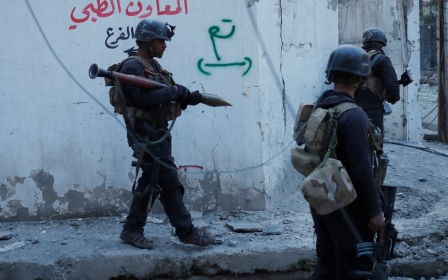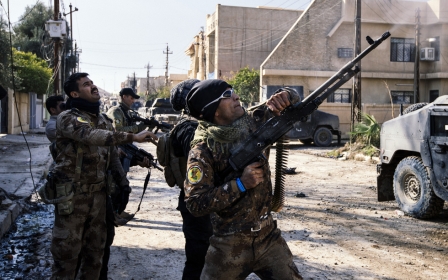Last exit Mosul: Iraq army takes IS's remaining escape route

Iraqi army units shut the last main exit out of the Islamic State group's stronghold in western Mosul, controlling access to the city from the northwest, a general and residents there said on Wednesday.
The army's 9th armoured division is within a kilometre of Mosul's "Syria Gate", the northwestern entrance of the city, a general from the unit told Reuters by telephone.
"We effectively control the road, it is within our sight," he said. Mosul residents said they had not been able to travel on the highway that begins at the "Syria Gate" since Tuesday.
The road links Mosul to Tal Afar, another Islamic State stronghold 60km to the west, and then to the Syrian border.
Iraqi forces took control of the city's southernmost bridge earlier this week, further hemming IS militants into western areas.
The army captured the eastern side of Mosul in January after 100 days of fighting and launched their attack on the districts that lie west of the Tigris river on 19 February.
If they defeat Islamic State in Mosul, it would crush the Iraq wing of the caliphate declared by the group's leader Abu Bakr al-Baghdadi in 2014.
Closing the western route further traps the estimated 750,000 civilians estimated to be living in Mosul's western areas.
According to Iraq's ministry of displacement and migration, only 16,000 of those have managed to escape since the battle for west Mosul began.
"There is serious concern for the 750,000 trapped in the densely populated western sector, with conditions worsening daily, according to reports from those who have managed to escape," Hala Jaber of the International Organisation for Migration said in a statement.
Those still in Mosul have to face IS's strict rule along with a lack of basic goods and the danger from the fighting.
"Women had to cover up, you couldn't walk in the street without a guardian. The rules were very harsh and food was very expensive - we could only afford to eat rice and bread," Baidaa, an 18-year-old with two children who had just fled from Mosul, said.
"They trapped us and they didn't want us to leave," she said of the militants.
Her two children did not "understand what's happening, they just followed us. They were so afraid of the firing from the fighting."
Fawzia Mohammed, a mother of 16 who also fled on Tuesday, said she and her family were trapped in their homes with little to eat.
"The last days were terrible. We were trapped inside by the fighting, we had no food," she said.
"The women were forced (by IS) to cover their faces, or stay at home. But that was okay - the worst was the violence, lashings, executions, cutting people," Mohammed said.
Stay informed with MEE's newsletters
Sign up to get the latest alerts, insights and analysis, starting with Turkey Unpacked
Middle East Eye delivers independent and unrivalled coverage and analysis of the Middle East, North Africa and beyond. To learn more about republishing this content and the associated fees, please fill out this form. More about MEE can be found here.





